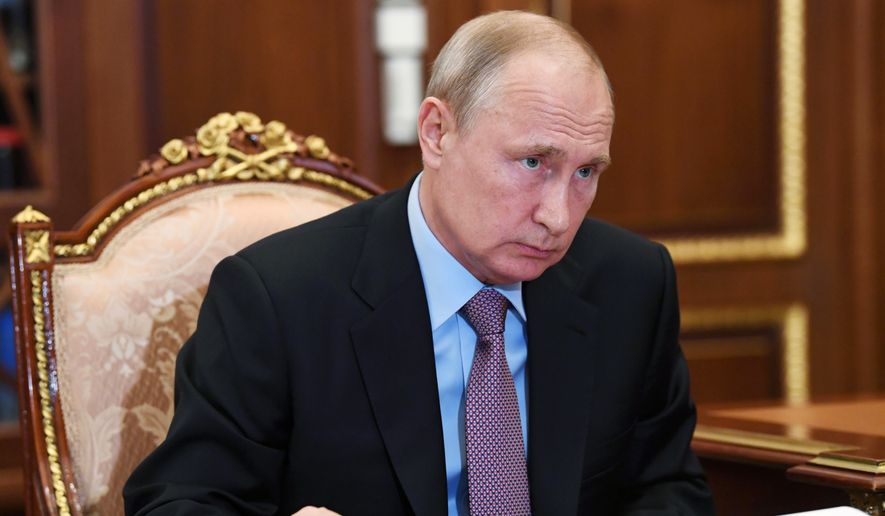OPINION:
National Security Adviser Robert O’Brien warned last month that America’s foreign adversaries will seek to exploit our domestic crises to “sew discord and to try and damage our democracy.”
With today’s headlines reading like the 1918 Spanish Flu, 1929 Great Depression, and 1968 race riots all rolled into one national emergency, the U.S. today is as vulnerable as ever to the Kremlin’s “active measures” propaganda designed to disparage our democracy as weak and lawless.
Having served as a KGB officer and director of Russia’s ruthless FSB security police, President Vladimir Putin relies on cloak-and-dagger espionage. Mr. Putin also holds a black belt in judo, a key principle of which is to use an opponent’s strength against them. Applying this technique to Russia’s strategic relationship with its “main enemy” — the United States, Mr. Putin uses our own open media and lively cyber debates to propagate false information meant to undermine faith in our democratic institutions.
The Kremlin’s goal is to destabilize the United States internally and tarnish the U.S. political process, because concepts such as liberty, freedom, and democracy constitute an existential threat to Russia’s corrupt regime. Mr. Putin knows if these enlightened ideas spread to Russia, his grip on power would be at risk.
In the new “Active Measures: The Secret History of Disinformation and Political Warfare,” author Thomas Rid lifts the veil on the history of espionage operations designed to influence public opinion. Mr. Rid’s exceptional scholarship is a timely contribution to our national security, especially with the upcoming 2020 presidential election already squarely in the Kremlin’s crosshairs.
The old Soviet KGB directed its agents to write covert influence newspaper articles, place false stories and disseminate fake documents. In this century’s interconnected and wide open cyberspace, Mr. Putin has a virtual, turbo-charged force multiplier for such operations. In 2016, the Kremlin aggressively manipulated social media, amplifying disinformation through bots and targeted advertising as well as weaponizing sensitive information hacked from the computers of the Hillary Clinton campaign and the Democratic National Committee.
Incorporating reporting from Soviet defector Ladislav Bittman, who served as the chief of the KGB’s disinformation unit, Mr. Rid uncloaks the dark art of disinformation through the mixing of accurate details with false ones. Just as the Soviets in the 1980s ran a disinformation campaign that the United States invented AIDS, today’s pro-Kremlin media has carried false reports that the COVID-19 coronavirus was a U.S. biological weapon.
Impersonating the KKK, the KGB sent leaflets containing racial attacks, postmarked in Washington D.C., to African and Asian Olympic committees in 1984. If past is prologue, we can expect the Kremlin to mount disinformation attacks designed to inflame our already dire racial and partisan divides.
The author demonstrates that disinformation is difficult to spot and its assault on objectivity is hard to defend or deter. Even the victim’s credible denials can strengthen rather than weaken the false narratives, giving them more visibility.
In light of Mr. Rid’s findings, there are three steps we should take to guard our national security.
First, our own free press should work diligently to expose all purveyors of disinformation, with a special focus on Russia. The intelligence community can help by declassifying indications of efforts to target our social media and networking sites with disinformation.
Second, social media and networking sites need accurate and quick-reacting “dashboards” to flag posts, videos and tweets which are assessed to spread propaganda. Cyber forensics should not take months to act, as happened in 2016; technical countermeasures can begin in seconds or minutes after the threat is detected. Facebook and Twitter have taken steps to counter overt foreign state-controlled media propaganda, but now might be a good time to reprise the 2018 hearings to press the social media giants to be even more vigilant.
Third, as we approach the 2020 presidential election fully cognizant of the threat from abroad, Democrats and Republicans should remember that what unites us as Americans is far more powerful than any partisan divide.
Russia did not create the vicious troika of health, economic and racial crises we now confront, but it’s certain the Kremlin and other adversaries will exploit our vulnerabilities if we fail to come together to stop them.
• Daniel N. Hoffman is a retired clandestine services officer and former chief of station with the Central Intelligence Agency. His combined 30 years of government service included high-level overseas and domestic positions at the CIA. He has been a Fox News contributor since May 2018. Follow him on Twitter @DanielHoffmanDC.




Please read our comment policy before commenting.